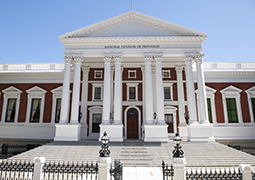
The National Council of Provinces (NCOP) held a strategic planning and review session to assess how well its committees have done so far and how it can improve to enable it to achieve its cooperative and intergovernmental mandates.
This was timely, given the fact that the meeting occurred “shortly after we have passed the halfway mark in the life of the sixth Parliament. It is a critical juncture at which we can say we are able to recall the work done so far and to re-assess our priorities,” said the Chairperson of the NCOP, Mr Amos Masondo.
Parliament’s committees lie at the heart of its constitutional mandates, Mr Masondo explained. This is because they monitor and oversee the work and budgets of national government departments and hold them accountable. They also initiate and amend Bills and consider provincial legislative proposals and special petitions. They may also examine specific areas of public interest.
The committees are supposed to push for accountability in a manner that considers the principles of cooperative government and intergovernmental relations, while respecting the jurisdictions, institutional integrity and powers of each sphere of governance.
This oversight work finds expression in programmes such as Local Government Week, which assists in sharing best practices and to standardise cooperative and intergovernmental practices across the local government sphere. “It is therefore important that we continue to reflect on the issues that SALGA [South African Local Government Association] has already deposited with us, especially during the Local Government Week programme held in 2020, and to support new initiatives that are aimed at facilitating progress in the fulfilment of the constitutional objectives of local government,” Mr Masondo said.
NCOP’s committees will also need to adjust their priorities in relation to the State of the Nation Address and other prevailing circumstances, he said.
Giving his input, the House Chairperson of Committee in the NCOP responsible for committees, Mr Jomo Nyambi, stated that Parliament’s mandate has not changed after the fire at Parliament. “We continue to work effectively and efficiently beyond partisan lines for the good cause of South Africans … We will take the opportunity afforded to us by this session to recommit to our constitutional mandate,” he reassured those in attendance. The NCOP also learnt, through the social unrests in July 2021, that committees need to be proactive and agile to prevailing situations rather than being reactive.
The Chief Whip of the NCOP, Mr Seiso Mohai, proclaimed that this session took place at the time when South Africa’s democratic and developmental agenda is facing enormous internal and external challenges. The biggest of these are external factors beyond our control, Mr Mohai said. Most notable of these challenges are the persistent effect of the 2008 global economic meltdown that continues to erode the capacity of the national fiscus to deal with poverty, unemployment and inequality. These problems have been compounded by the Covid-19 pandemic.
Parliament needs to situate its thinking within this macroeconomic framework to consider new ways of doing business that respond these challenges, he said. We need to determine what impact this session will have on the broader mandate of the NCOP. “It’s critical to consider what impact is our plan going to make on the lives of the people? How are we going to measure this impact? How are our plans going to foster social compact with array of social forces at play as the architects of the collective future of our people?”
To respond to some of these questions, we need to revive the ethos of an “activist” parliament, he reckoned. This can be achieved if NCOP’s committees could forge a social compact with interest groups in pursuit of a people-centred parliamentary posture.
In his presentation, the Director of Parliamentary Budget Office, Dr Dumisani Dyantjies, pointed to the lack of technical and administrative capacities as the root cause of the financial distress of many municipalities. This leads to underspending of infrastructure grants. Greater spending efficiency and fiscal discipline is required in provinces and municipalities to improve service delivery.
In her presentation, the Acting Secretary to Parliament, Ms Baby Tyawa, stated that the role of parliamentary staff is to ensure that committees improve the quality of their scrutiny of money bills and budgetary recommendations. “We are aligning our budget priorities accordingly, she said.
Furthermore, committees will be given more space and time for oversight work. There are also plans to improve parliamentary staff analysis and research outputs, which will give committee members deeper insight into the oversight issues they face. Ms Tyawa remarked that although Covid-19 brought untold human and economic distress, it assisted Parliament to enhance its technological capacities and members were trained to use hybrid forms of communication for their committee work.
Abel Mputing
2 March 2022

